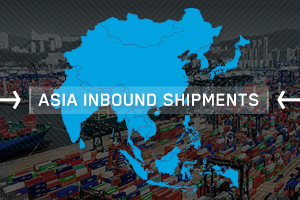
Geopolitical uncertainties such as Brexit, the China-U.S. trade war, and the trade conflict between Japan-Korea all impact today’s shipping market. A lot of C.H. Robinson’s coverage of these and other disruptions has focused on what it means for companies shipping into North America. But these same disruptions are also causing serious challenges to the transportation industry in China and Asia at large.
The immediate effects in China
As you might imagine, the high tariffs imposed in the China-U.S. trade war have negatively impacted China’s economy. Several trends are already apparent.
Consumption is weakening and retail sales are down
According to The World Bank, this downward path could end up reducing China’s domestic consumption of imported products by 6% before the end of 2019.
Production is leaving China
While once China may have been on track to becoming “the world’s factory for goods” that trajectory has changed. Now China is quickly becoming a consumption country. The South China Morning Post reports that China’s annual GDP growth has already fallen 6.2% in 2019—a downward trend that indicates what’s in store for the future. Labor-intensive products such as textiles, apparels, footwear, and furniture are the first industries whose production will leave China.
China is offering incentives for factories moving west
In an effort to keep production within China, the government has offered many incentives for companies who agree to move production into China’s western region. Areas like Sichuan, Guizhou, Yunnan, Shaanxi, Gansu, and Qinghai come with cheaper labor and lower expenses compared to China’s coastal cities. Unfortunately, moving factories west also creates extra expenses for inland freight as well as added transit time from the port terminal.
China’s semiconductor market is expected to show eventual grow
On a positive note, the Nikkei Asian Review estimates that the semiconductor market in China will grow in the medium term. After all, many fabricators are still in the establishment phase and can take recent changes into account when planning.
Ongoing impact in Southeast Asia countries
Of course, China is not the only country affected by the many disruptions we’ve seen in 2019. In fact, almost all Southeast Asia countries have seen some change:
Singapore as the most competitive country
Bloomberg states that Singapore has the world’s best airport. Add in the fact that the country ranks second for the world’s busiest ocean port terminal—36.6 million TEUs in 2018—and it would seem that Singapore is thriving. However, Singapore has also suffered an economic downturn since June 2019, due in part to the China-U.S. trade war wreaking havoc on many Asia export hubs. With growth only at 0.1% in Q2 2019, Singapore suffered their lowest Q2 growth in a decade.
Indonesia expected to maintain growth
Unlike other Asia Pacific countries, many experts expect Indonesia to maintain their economic growth in 2019 given its more domestically driven economy. This may help the country reduce the impact of trade conflicts better than their regional neighbors have.
Vietnam to become world’s factory?
Vietnam may just come out on top of the trade disruptions. With a strong infrastructure, including a deep-sea port that serves mega-vessels, Vietnam could be on track to replace China as the world’s factory. Already, many retailers have shifted production and manufacturing to Vietnam to avoid costly tariffs and maintain their competitiveness in the market.
Top inbound shipping challenges into China
In addition to the recent market disruptions, there are certain policies that are causing even more direct challenges to companies looking to import their goods into China.
Industrial policies favor domestic commodities
China often pursues industrial policies that limit market access for imported commodities from foreign manufacturers and foreign service providers. Instead, they promote business for domestic companies, which often limit the benefits of foreign companies and service providers.
Depreciation of China’s renminbi
China strategically keeps the value of the renminbi (RMB) weak to keep exports from China inexpensive and competitive. The BBC estimates China’s RMB will weaken even further than expected in the rest of the year and into 2020.
Extradition bill unrest in Hong Kong
The ongoing unrest in Hong Kong of the extradition bill is also affecting the economy. In fact, the South China Morning Post reported the latest numbers from the Chinese government. The article states that Q2 retail sales in Hong Kong dropped 6.7%–quite a significant difference from the 0.6% in Q1. The article also forecasts the import volumes via Hong Kong to China will also be affected.
Conclusion
The import market into Asia is significantly out of sorts to what we’ve come to expect. Leveraging your resources and the right expertise can help deal with these ongoing changes. It’s critical to work with a company and people you can trust in times of uncertainty. Turn to C.H. Robinson’s local experts in offices around the globe to help manage your freight and ensure any problems are resolved in real time.
Get in touch with one of our global forwarding or trade policy experts today.



